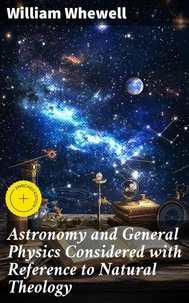On the Philosophy of Discovery, Chapters Historical and Critical
Par :Formats :
Disponible dans votre compte client Decitre ou Furet du Nord dès validation de votre commande. Le format ePub est :
- Compatible avec une lecture sur My Vivlio (smartphone, tablette, ordinateur)
- Compatible avec une lecture sur liseuses Vivlio
- Pour les liseuses autres que Vivlio, vous devez utiliser le logiciel Adobe Digital Edition. Non compatible avec la lecture sur les liseuses Kindle, Remarkable et Sony
 , qui est-ce ?
, qui est-ce ?Notre partenaire de plateforme de lecture numérique où vous retrouverez l'ensemble de vos ebooks gratuitement
Pour en savoir plus sur nos ebooks, consultez notre aide en ligne ici
- Nombre de pages494
- FormatePub
- ISBN859-65--4736870-0
- EAN8596547368700
- Date de parution16/09/2022
- Protection num.Digital Watermarking
- Taille903 Ko
- Infos supplémentairesepub
- ÉditeurDIGICAT
Résumé
In "On the Philosophy of Discovery, Chapters Historical and Critical, " William Whewell embarks on an intellectual exploration of the processes and principles underpinning scientific discovery. This work is marked by Whewell's erudite narrative style, blending historical analysis with philosophical inquiry, as he examines pivotal moments in scientific advancement and the cognitive frameworks that facilitated them.
His meticulous approach situates the book within the broader context of 19th-century philosophy and the scientific revolution, as Whewell reflects on the interplay between empirical observation and theoretical formulation. Whewell, a polymath and key figure in the evolution of scientific thought, draws from his extensive background in natural philosophy, mathematics, and history of science. His engagements with contemporaries, such as Charles Lyell and John Stuart Mill, likely prompted Whewell to articulate a coherent philosophy of science that stresses induction and the role of hypothesis in scientific inquiry.
By intertwining his own insights with critical historical episodes, Whewell seeks to illuminate the often opaque mechanisms of discovery. This book is a must-read for scholars and enthusiasts of the philosophy of science, offering a profound examination of how knowledge is constructed. Whewell's rigorous discourse invites readers to reflect on the nature of discovery itself, enriching their understanding of both historical and contemporary scientific practices.
His meticulous approach situates the book within the broader context of 19th-century philosophy and the scientific revolution, as Whewell reflects on the interplay between empirical observation and theoretical formulation. Whewell, a polymath and key figure in the evolution of scientific thought, draws from his extensive background in natural philosophy, mathematics, and history of science. His engagements with contemporaries, such as Charles Lyell and John Stuart Mill, likely prompted Whewell to articulate a coherent philosophy of science that stresses induction and the role of hypothesis in scientific inquiry.
By intertwining his own insights with critical historical episodes, Whewell seeks to illuminate the often opaque mechanisms of discovery. This book is a must-read for scholars and enthusiasts of the philosophy of science, offering a profound examination of how knowledge is constructed. Whewell's rigorous discourse invites readers to reflect on the nature of discovery itself, enriching their understanding of both historical and contemporary scientific practices.
In "On the Philosophy of Discovery, Chapters Historical and Critical, " William Whewell embarks on an intellectual exploration of the processes and principles underpinning scientific discovery. This work is marked by Whewell's erudite narrative style, blending historical analysis with philosophical inquiry, as he examines pivotal moments in scientific advancement and the cognitive frameworks that facilitated them.
His meticulous approach situates the book within the broader context of 19th-century philosophy and the scientific revolution, as Whewell reflects on the interplay between empirical observation and theoretical formulation. Whewell, a polymath and key figure in the evolution of scientific thought, draws from his extensive background in natural philosophy, mathematics, and history of science. His engagements with contemporaries, such as Charles Lyell and John Stuart Mill, likely prompted Whewell to articulate a coherent philosophy of science that stresses induction and the role of hypothesis in scientific inquiry.
By intertwining his own insights with critical historical episodes, Whewell seeks to illuminate the often opaque mechanisms of discovery. This book is a must-read for scholars and enthusiasts of the philosophy of science, offering a profound examination of how knowledge is constructed. Whewell's rigorous discourse invites readers to reflect on the nature of discovery itself, enriching their understanding of both historical and contemporary scientific practices.
His meticulous approach situates the book within the broader context of 19th-century philosophy and the scientific revolution, as Whewell reflects on the interplay between empirical observation and theoretical formulation. Whewell, a polymath and key figure in the evolution of scientific thought, draws from his extensive background in natural philosophy, mathematics, and history of science. His engagements with contemporaries, such as Charles Lyell and John Stuart Mill, likely prompted Whewell to articulate a coherent philosophy of science that stresses induction and the role of hypothesis in scientific inquiry.
By intertwining his own insights with critical historical episodes, Whewell seeks to illuminate the often opaque mechanisms of discovery. This book is a must-read for scholars and enthusiasts of the philosophy of science, offering a profound examination of how knowledge is constructed. Whewell's rigorous discourse invites readers to reflect on the nature of discovery itself, enriching their understanding of both historical and contemporary scientific practices.




